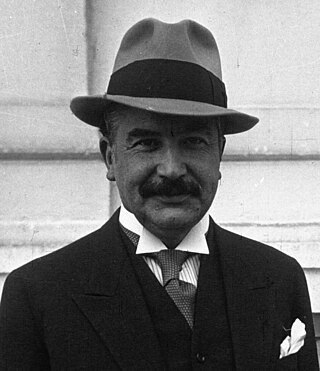| |||||
| Decades: | |||||
|---|---|---|---|---|---|
| See also: | |||||
The following lists events that happened during 1951 in the Grand Duchy of Luxembourg.
| |||||
| Decades: | |||||
|---|---|---|---|---|---|
| See also: | |||||
The following lists events that happened during 1951 in the Grand Duchy of Luxembourg.
Luxembourg is a parliamentary representative democratic monarchy, whereby the prime minister is the head of government, and the multi-party system. Executive power is under the constitution of 1868, as amended, exercised by the government, by the grand duke and the Council of Government (cabinet), which consists of a prime minister and several other ministers. Usually, the prime minister is the leader of the political party or coalition of parties having the most seats in parliament. Legislative power is vested in both the government and parliament. The judiciary is independent of the executive and the legislature.

The Luxembourg Socialist Workers' Party, abbreviated to LSAP or POSL, is a social democratic, pro-European political party in Luxembourg. The LSAP sits on the centre-left of the political spectrum.

The Democratic Party, is the major liberal political party in Luxembourg. One of the three major parties, the DP sits on the centre to centre-right, holding moderate market liberal views combined with a strong emphasis on civil liberties, human rights, and internationalism.
The National Union Government was a form of national government that governed the Grand Duchy of Luxembourg between 1945 and 13 February 1947, in the direct aftermath of the Second World War. During the war, Luxembourg was invaded, occupied, and annexed by Nazi Germany. Just one of the Luxembourgish casualties of the conflict was the pre-war political system; most of the established parties and alliances disappeared, and some of the leading politicians had lost their lives.
Paul Wilwertz was a Luxembourgish politician for the Luxembourg Socialist Workers' Party (LSAP). He was Mayor of Luxembourg City for five years, as well as sitting in the Chamber of Deputies and holding positions in the government.

The first Juncker–Asselborn Government was the government of Luxembourg between 31 July 2004 and 23 July 2009. It was led by, and named after, Prime Minister Jean-Claude Juncker and Deputy Prime Minister Jean Asselborn.

The Juncker–Polfer Government was the government of Luxembourg between 7 August 1999 and 31 July 2004. It was led by, and named after, Prime Minister Jean-Claude Juncker and Deputy Prime Minister Lydie Polfer.

The Juncker–Asselborn II Government was the government of Luxembourg between 23 July 2009 and 11 July 2013. It was led by, and named after, Prime Minister Jean-Claude Juncker and Deputy Prime Minister Jean Asselborn. It was formed on 23 July 2009, after the 2009 election to the Chamber of Deputies. It fell after the withdrawal of the Luxembourg Socialist Workers' Party from the government; Prime Minister Juncker submitted his resignation to the Grand Duke on 11 July 2013, and a snap election was called.

The Santer-Poos III Government was the government of Luxembourg between 13 July 1994 and 26 January 1995. It was the third of three led by, and named after, Prime Minister Jacques Santer. Throughout the ministry, the Deputy Prime Minister was Jacques Poos.

The Werner-Cravatte Government was the government of Luxembourg between 15 July 1964 and 6 February 1969. Throughout its term, the Deputy Prime Minister was Henry Cravatte, replacing Eugène Schaus, who had been Deputy Prime Minister in the first Werner-Schaus Government. It was a coalition between the Christian Social People's Party (CSV), and the Luxembourg Socialist Workers' Party (LSAP).

The first Werner-Schaus Government was the government of Luxembourg between 2 March 1959 and 15 July 1964. It was a coalition between the Christian Social People's Party (CSV), and the Democratic Party. It was formed after the general election of 1959.

The Bech-Bodson Ministry was the government of Luxembourg between 29 December 1953 and 29 March 1958. It was a coalition between the Christian Social People's Party (CSV), and the Luxembourg Socialist Workers' Party (LSAP).

The Dupong-Bodson Ministry was the government of Luxembourg between 3 July 1951 and 23 December 1953. It was a coalition between the Christian Social People's Party (CSV), and the Luxembourg Socialist Workers' Party (LSAP). It was formed after the general election of 1951.
The following lists events that happened during 1969 in the Grand Duchy of Luxembourg.
The following lists events that happened during 1964 in the Grand Duchy of Luxembourg.
The following lists events that happened during 1959 in the Grand Duchy of Luxembourg.
The following lists events that happened during 1954 in the Grand Duchy of Luxembourg.
The following lists events that happened during 1953 in the Grand Duchy of Luxembourg.
The following lists events that happened during 1950 in the Grand Duchy of Luxembourg.